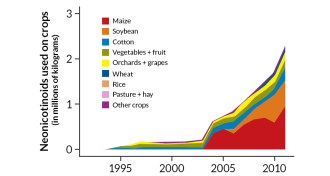Environment
-
 Environment
EnvironmentLow levels of lead linked to lower test scores in children
A large study in grade-school children finds that even low blood levels of lead may be associated with poor school performance.
By Beth Mole -
 Environment
EnvironmentOil from BP spill probably sprayed out in tiny drops
Oil that gushed from the well in the 2010 Deepwater Horizon spill may have shattered into tiny droplets, with high pressures doing the work of dispersants.
By Beth Mole -
 Science & Society
Science & SocietyOne anniversary to celebrate, one to contemplate
In this issue, both feature articles focus on anniversaries, though of two very different kinds.
By Eva Emerson -
 Environment
EnvironmentControversial insecticide use rises as farmers douse seeds
Use of neonicotinoids, a class of controversial insecticides, has risen dramatically, posing threat to pollinating insects.
By Beth Mole -
 Environment
EnvironmentFive years on, Deepwater Horizon oil spill’s impact lingers
Five years after the Gulf of Mexico’s largest disaster, researchers are still studying its ecological impact and struggling to learn the fate of most of the spilled oil.
By Beth Mole -
 Environment
EnvironmentTampons: Not just for feminine hygiene
Tampons soaked in polluted water glow under UV light, revealing detergent-filled wastewater in rivers.
-
 Environment
EnvironmentFracking chemicals can alter mouse development
Hormone-disrupting chemicals used in fracking fluid cause developmental changes in mice, new experiments show.
By Beth Mole -
 Materials Science
Materials ScienceSuds turn silver nanoparticles in clothes into duds
Bleach-containing detergents destroy antibacterial silver nanoparticles that coat clothes.
By Beth Mole -
 Chemistry
ChemistryAir pollution molecules make key immune protein go haywire
Reactive molecules in air pollution derail immune responses in the lung and can trigger life-long asthma.
By Beth Mole -
 Environment
EnvironmentManganese turns honeybees into bumbling foragers
Ingesting low doses of the heavy metal manganese disrupts honeybee foraging, a new experiment suggests.
-
 Environment
EnvironmentReplacement for toxic chemical in plastics, receipts may be just as toxic
Mounting evidence suggests that BPS, a common chemical in plastics, may cause the same health effects as BPA.
By Beth Mole -
 Environment
EnvironmentA coast-to-coast picture of America’s cacophony of sounds
The National Park Service mapped noise across the United States.
By Susan Milius